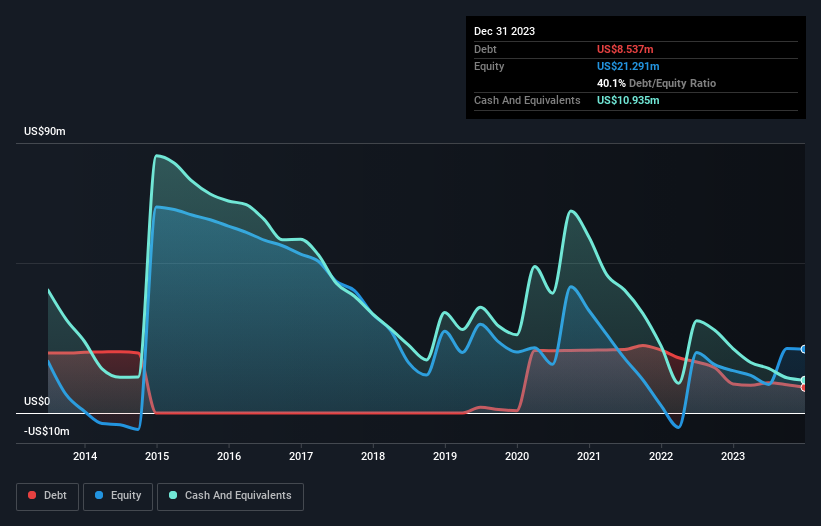- United States
- /
- Medical Equipment
- /
- NasdaqCM:RMTI
Does Rockwell Medical (NASDAQ:RMTI) Have A Healthy Balance Sheet?
Warren Buffett famously said, 'Volatility is far from synonymous with risk.' When we think about how risky a company is, we always like to look at its use of debt, since debt overload can lead to ruin. We can see that Rockwell Medical, Inc. (NASDAQ:RMTI) does use debt in its business. But the more important question is: how much risk is that debt creating?
Why Does Debt Bring Risk?
Debt and other liabilities become risky for a business when it cannot easily fulfill those obligations, either with free cash flow or by raising capital at an attractive price. In the worst case scenario, a company can go bankrupt if it cannot pay its creditors. However, a more usual (but still expensive) situation is where a company must dilute shareholders at a cheap share price simply to get debt under control. Of course, the upside of debt is that it often represents cheap capital, especially when it replaces dilution in a company with the ability to reinvest at high rates of return. When we think about a company's use of debt, we first look at cash and debt together.
View our latest analysis for Rockwell Medical
What Is Rockwell Medical's Debt?
You can click the graphic below for the historical numbers, but it shows that Rockwell Medical had US$8.54m of debt in December 2023, down from US$9.69m, one year before. However, its balance sheet shows it holds US$10.9m in cash, so it actually has US$2.40m net cash.

How Strong Is Rockwell Medical's Balance Sheet?
According to the last reported balance sheet, Rockwell Medical had liabilities of US$16.6m due within 12 months, and liabilities of US$14.2m due beyond 12 months. Offsetting these obligations, it had cash of US$10.9m as well as receivables valued at US$10.9m due within 12 months. So its liabilities total US$9.05m more than the combination of its cash and short-term receivables.
Of course, Rockwell Medical has a market capitalization of US$48.2m, so these liabilities are probably manageable. But there are sufficient liabilities that we would certainly recommend shareholders continue to monitor the balance sheet, going forward. Despite its noteworthy liabilities, Rockwell Medical boasts net cash, so it's fair to say it does not have a heavy debt load! The balance sheet is clearly the area to focus on when you are analysing debt. But ultimately the future profitability of the business will decide if Rockwell Medical can strengthen its balance sheet over time. So if you want to see what the professionals think, you might find this free report on analyst profit forecasts to be interesting.
In the last year Rockwell Medical wasn't profitable at an EBIT level, but managed to grow its revenue by 15%, to US$84m. That rate of growth is a bit slow for our taste, but it takes all types to make a world.
So How Risky Is Rockwell Medical?
We have no doubt that loss making companies are, in general, riskier than profitable ones. And we do note that Rockwell Medical had an earnings before interest and tax (EBIT) loss, over the last year. And over the same period it saw negative free cash outflow of US$9.7m and booked a US$8.6m accounting loss. However, it has net cash of US$2.40m, so it has a bit of time before it will need more capital. Summing up, we're a little skeptical of this one, as it seems fairly risky in the absence of free cashflow. When analysing debt levels, the balance sheet is the obvious place to start. But ultimately, every company can contain risks that exist outside of the balance sheet. To that end, you should learn about the 3 warning signs we've spotted with Rockwell Medical (including 2 which are a bit concerning) .
At the end of the day, it's often better to focus on companies that are free from net debt. You can access our special list of such companies (all with a track record of profit growth). It's free.
New: AI Stock Screener & Alerts
Our new AI Stock Screener scans the market every day to uncover opportunities.
• Dividend Powerhouses (3%+ Yield)
• Undervalued Small Caps with Insider Buying
• High growth Tech and AI Companies
Or build your own from over 50 metrics.
Have feedback on this article? Concerned about the content? Get in touch with us directly. Alternatively, email editorial-team (at) simplywallst.com.
This article by Simply Wall St is general in nature. We provide commentary based on historical data and analyst forecasts only using an unbiased methodology and our articles are not intended to be financial advice. It does not constitute a recommendation to buy or sell any stock, and does not take account of your objectives, or your financial situation. We aim to bring you long-term focused analysis driven by fundamental data. Note that our analysis may not factor in the latest price-sensitive company announcements or qualitative material. Simply Wall St has no position in any stocks mentioned.
About NasdaqCM:RMTI
Rockwell Medical
Develops, manufactures, commercializes, and distributes various hemodialysis products for dialysis providers worldwide.
Flawless balance sheet and good value.
Similar Companies
Market Insights
Community Narratives




